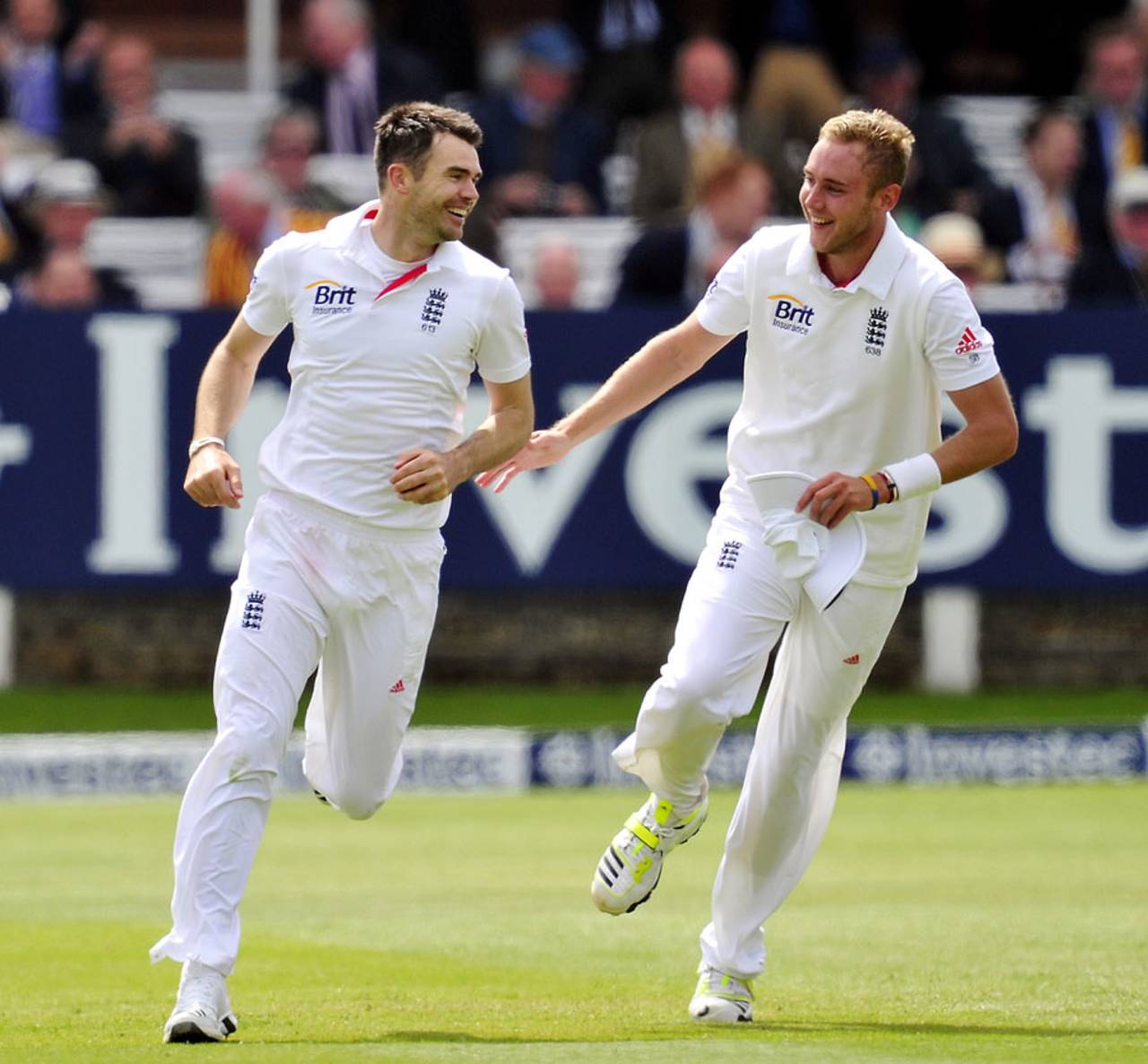Of sledging and suchlike
The Trott incident shows that there are plenty of matters of consequence worth discussing in cricket, but we insist on flying into a frenzy over the trivial
Dave Hawksworth
28-Nov-2013

Broad and Anderson are past masters at getting opposition backs up • AFP
Under normal circumstances the debate surrounding Australia's 381-run victory over England at the Gabba would concentrate on what that result means for the balance of power between the two sides.
Are Australia just benefiting from playing at Fortress Brisbane? After seven Test match defeats this year on tour, are they reaffirming themselves as yet another international team that is strong at home and weak away? Or has Darren Lehmann engineered a far more substantial change in fortune; one that could see them reclaim the Ashes and perhaps eventually go on to challenge South Africa for Test supremacy?
Have England merely succumbed to their habit of losing the first Test on a tour by a heavy margin? Can they bounce back to win the series, as they did a year ago in India? Or has their frail batting line-up exposed them as a side in steady decline?
These are all questions that have been debated during the last week or so, but also questions that have been overshadowed by other issues: some serious, some far more petty.
As the first Test approached, we saw parts of the Australian media turn up the dial to 11 on their usual tub-thumping, with much of it concentrating on Stuart Broad for standing his ground at Trent Bridge in July (in a manner that is routine for players on both sides in an Ashes series). The criticism Broad received became increasingly ridiculous until it culminated in one Brisbane newspaper refusing to print his name in match reports. It was a level of maturity similar to that you'd find in a three-year-old pretending not to hear someone who'd annoyed them.
Broad, of course, isn't a cricketer who induces overwhelming feelings of sympathy among opposition fans. As such, he's a relatively easy target. And for the tabloid press, whether it's English or Australian, those are the most tempting targets of all.
Jimmy Anderson is another player who makes a habit of putting opposition backs up, and as the Brisbane Test approached its climax, it was unsurprising that he was at the centre of events when tempers frayed and the issue of sledging came to the fore once again.
Anderson is rarely shy of sharing his opinion with opposition players, and on this occasion he may have been lucky that the stump microphone only broadcast part of a lively debate he was conducting with members of the Australian team, which featured some fairly basic Anglo-Saxon terms and threats of violence that might have carried more menace if they weren't being delivered by someone wearing white elasticised trousers.
I've no issue with sledging in principle. Test cricket should be played hard, and occasionally that will lead to a frank exchange of views. But if you're going to try and verbally get one up on the opposition, the most effective way is to use intelligence and humour. Search the internet and you'll find lists of comments made during matches that show exactly that kind of wit. But they are, you suspect, very much exceptions to the rule. As whenever "on-field banter" is inadvertently broadcast we rarely get a glimpse of Wildean wit, more often an appreciation that trying to sound tough is an excellent way of making yourself look like a bit of a prat.
That debate on sledging continued when news broke that Jonathan Trott was returning home to England with a stress-related illness.
Like the vast majority of people, I'm not qualified to comment on the reasons behind Trott's illness and what triggered his decision to return home. What I can comment on is the chasm of understanding that exists between articles written by those with an appreciation and experience of the situation Trott finds himself in and some of the ill-informed speculative nonsense that can be found on social media and in comments on this very site.
The oft-repeated implicated that Trott has shown weakness seems little removed from the days when post-traumatic stress disorder was interpreted as cowardice. When those comments are wrapped in the nationalism of "our players don't suffer from this", they imply that mental health can be determined by arbitrary lines on a map and ignore the possibility that we are starting to see the tip of an iceberg in professional sport that is hidden from view rather than maturely discussed in the open.
Health is more important than a game - a phrase that has been much used in the last few days. But what Trott's departure has also highlighted to me is how often cricket wastes time and attention on petty inanities - finding a cartoon villain, mindless on-field banter, pointless nationalism - rather than addressing issues that are truly important.
For a sport that prides itself on being intellectual, there is all too often a lack of intelligence when we choose the issues worthy of discussion.
Dave Hawksworth has never sat in a press box or charged a match programme to expenses